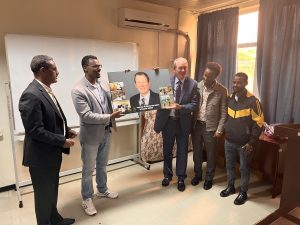“ICT from Supporting to Core Activity”
The Ethiopian Institute of Agricultural Research (EIAR) conducted a workshop in Adama focused on the Digital Agriculture Research. The workshop was attended by senior EIAR officials.
Professor Nigussie Dechasa, the Director General of EIAR, inaugurated the workshop and emphasized the critical necessity for research institutes to embrace modern technological advancements. In his opening remarks, he underscored that the integration of contemporary technologies is no longer optional but mandatory for the effective functioning and modernization of research entities. He indicated that the financial system needs to be backed by digital software and highlighted the importance of transitioning research practices to a fully digital format, ensuring that data collection, analysis, and dissemination will be conducted via digital platforms.
Following that, Mr. Gezahegne Tolosa, the ICT executive of EIAR, provided insights into the current status of ICT within the institute. He presented the importance of proper data management, particularly how a research institute ought to collect, store, and utilize its data effectively.
Mr. Gezahegn highlighted a significant issue: the current setup involves storing the institute’s database on individual storage devices such as flash discs, personal laptops, and desktop computers. This decentralized approach to data storage raises serious concerns about the security and reliability of the information. Each device is susceptible to various risks, including potential losses through theft, accidental deletion, hardware failures, or technical malfunctions, which could lead to irretrievable loss of critical research data. To mitigate these risks, Mr. Gezahegn emphasized the need for the institute to implement a more streamlined and secure system for data management. This would likely involve establishing a centralized system where data can be safely stored and regularly backed up, minimizing the chances of data loss and damage. This would likely involve establishing a centralized system where data can be safely stored and regularly backed up, minimizing the chances of data loss and damage.
According to Mr. Gezahegn, the institution recognizes the pressing challenges it faces and has taken proactive steps to address them by establishing a memorandum of understanding (MoU) with INSA. This collaborative agreement signifies a commitment to working alongside INSA’s experts, who bring a wealth of specialized knowledge and experience pertinent to the issues identified in the institution’s preliminary study.
Subsequently, ICT specialists from INSA showcased their initial assessment of the institution, which included an infrastructure review and an evaluation of large research data management. They pinpointed the institution’s shortcomings and offered suggestions on the next steps to take. Additionally, they conducted a thorough analysis of cloud computing services, digital data centers, and ways to enhance agricultural research.
Ultimately, the research papers that were presented were deliberated upon, and the way forward actions were provided to assist in advancing ongoing efforts.





